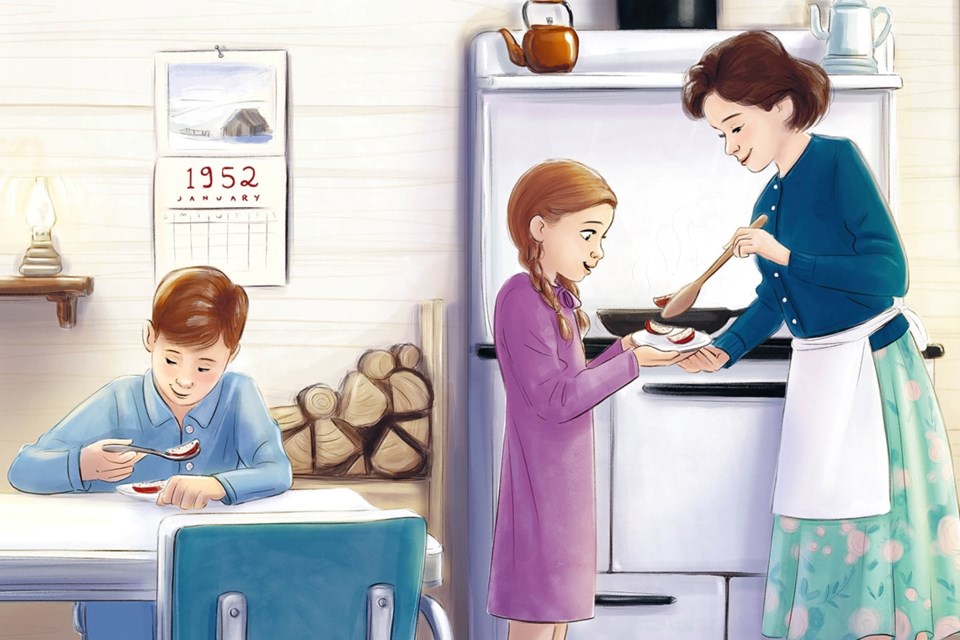Memories of Britt’s electrification flipped a switch for author Pat Skene.
The moment struck while she was working on her memoir, Swiftly Flowing Waters, published by Plumleaf Press. Her story focuses on her childhood in Britt, her time living in Sudbury and North Bay, and a transformative cross-country trip to British Columbia, where she embarked a new chapter working with the CIBC.
While delving into her childhood memories for the book, the day electricity came to Britt stood out, and she realized that momentous time would make for a great children’s story. Skene would know, having a knack for writing popular children’s books. She took the idea and turned it into her 8th book for children. “Lights Along the River,” published by Orca Book Publishers, is a picture book all about those historic days in 1952 when the lights turned on in Britt, a small community on the Magnetawan River on Georgian Bay.
“Wouldn’t it be great to have them be able to go back in time and take a look at what life was like?” she said, speaking of her young readers. She knew kids today would find the idea of life without electricity fantastic, and the author felt it was important to open a window to that world. Skene’s book also emphasizes just how much can change during one’s lifetime. The author is turning 79, but to many, a world without electricity exists solely within an imagined past.
What will today’s children see when they reach their golden years? That was one of the questions Skene kept in her mind as she wrote Lights Along the River. The book well-encapsulates those transformative days, even more so as illustrator Sabrina Gendron based many of the drawings on photos Skene provided.
“The inside of the house” depicted in the story “is what the inside of my house looked like. She captured everything, right down to the detail of the wallpaper.”
Change is inevitable, and Skene’s book asks readers to reflect on how those technological changes usher in a host of social changes. “We used to tell a lot of stories around the kitchen table,” she recalled, “and of course, when television comes in, those evenings are not the same anymore. You sit in front of somebody else’s story.”
However, Skene never stopped believing in the power of her own stories, and once she retired, she began writing children’s books, and now a memoir.
Her career with the bank is detailed throughout her memoir. Her work led to the creation of President’s Choice Financial, the first on-line bank in Canada. She recalls many stories from those days in her memoir, as well as travel stories. It was a difficult book to write, as bringing to light certain chapters from her life brought back a lot of emotions from those days.
Specifically, writing about the death of her husband was very difficult. “It’s very daunting,” writing a life story, she admitted. “You turn yourself inside out and put yourself between the pages of a book for everybody to see. It’s a daunting experience.”
Thoughts of leaving her story for her daughter and grand daughter helped her find the strength to carry on. She also found strength in her Metis heritage – a heritage that was never discussed when she was a child – a heritage that she further discovered as she researched her memoir.
“We never discussed being Indigenous at all,” she recalled. The family didn’t discuss it, her mother “just forbid it,” but while writing, “I dug into who we were, and in 2021 I became an official Metis citizen,” which is “a remarkable thing to embrace.”
Skene’s memoir details many transformative experiences, from her battle with cancer, and re-inventing herself on the West coast.
“I had no money” when she headed west to start a different life, with “a five-year-old to take care of and I went on to become a Vice President at CIBC,” Skene summarized, “and I think that’s why I wrote this memoir.”
It’s a story about new beginnings, and not giving up. “I really feel I have a story to tell, and I think that when people read a story like mine, especially women, I think it helps to offer hope in challenging times. Those times all women quietly go through.”
“We go through so many challenges in life and we just deal with,” she added. “And I think that it would be important for women to find themselves in my stories and maybe they will serve as a guidepost for any of the challenges they might face.”
“And that’s what I’m hopeful for.”
David Briggs is a Local Journalism Initiative reporter who works out of BayToday, a publication of Village Media. The Local Journalism Initiative is funded by the Government of Canada.



